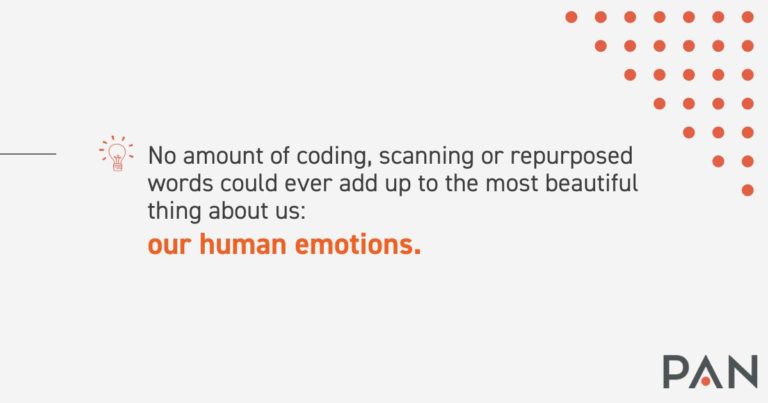This piece is part of AI on the Move, a PAN series that explores the ongoing impacts of artificial intelligence on marketing and PR.
Artificial Intelligence vs. Human Intelligence: Can Machines Replace Humans?
Thanks to the swift evolution of ChatGPT, it’s no longer a question of if machines can replace humans, but rather — should they?
 As long as external threats to American job security exist, so too shall our skepticism of every potential job-replacing technology brought to market, including — and perhaps especially — ChatGPT. And like any debate circling such a sensitive and career-defining issue, there are strong opinions on both sides of the aisle:
As long as external threats to American job security exist, so too shall our skepticism of every potential job-replacing technology brought to market, including — and perhaps especially — ChatGPT. And like any debate circling such a sensitive and career-defining issue, there are strong opinions on both sides of the aisle:
- AI can and should perform jobs historically assigned to humans whenever possible; and,
- AI replacing humans in any job to full capacity is ludicrous and should never happen.
Even the most hardcore of skeptics will admit that the recent version of ChatGPT is not only hard to ignore — it’s damn near impossible. Surpassing the one-million-user mark a shy seven days past its launch, OpenAI’s ChatGPT is passing Ivy League entrance exams, dodging AI detectors, and even getting into law school.
Educators are furious. It’s the end of human writing!
Technologists are excited. It’s the beginning of limitless possibilities!
Businesses are ecstatic. I can save money on writing and marketing!
Marketers are…to be honest…a mix of all of it.
But there’s one thing us marketers have that those machines never will — human intelligence. No amount of coding, scanning or repurposed words could ever add up to the most beautiful thing about us: our human emotions.
Businesses eager to adopt AI tools as a replacement for – or even supplement to – human output would be wise to consider potential implications, such as risking brand loyalty.
People Trust People, Not Machines

A staggering number of consumers report that the experience a company provides (referred to as the buyer’s journey) is just as important as its products and services.
A consistently great customer experience is what builds trust and earns repeat business. A consistently poor or even mildly unpleasant experience is what leads to loss of trust.
And with up to 71% of consumers ready to quit a brand if they lose trust in it, businesses must prioritize earning and maintaining such precious currency at every possible touchpoint. PAN’s own research revealed 42% of consumers would remain loyal to an honest brand even if it didn’t have the best product or service.
Which is exactly why a company’s marketing efforts should remain — at least somewhat — in human hands.
Balancing Humanness with AI: The Power of Collaborative Intelligence
Earlier we reviewed two common responses to the debate about whether artificial intelligence should replace human workers: one being strongly for; the other being strongly opposed.
But what about the third argument? The one where we don’t have to choose a side, but instead leverage the best parts of humans and machines to achieve incredible things?
This concept, called collaborative intelligence, provides a path for businesses to use the power of artificial intelligence without sacrificing the innate humanness that can only come from, well, humans.
A Harvard Business Review study supports this thinking. Having surveyed 1,500 firms representing a variety of industries, researchers found that “the biggest performance improvements come when humans and smart machines work together, enhancing each other’s strengths,” rather than working in opposition.
There are countless use cases for collaborative intelligence in modern-day marketing. Businesses that can successfully strike a balance between people and AI in marketing will not only win consumer minds, but also their hearts.
Related Read: Change is Good – A Retrospective on Marketing Strategies from the Last Eight Years
4 More Reasons AI Should Supplement Marketers, Not Replace Them
1. AI (including ChatGPT) can only write about what’s already been written

How can ChatGPT write an article about “how to write a content strategy” in seconds? Because approximately 1.3 BILLION people already published articles about how to do it. The AI tool quickly scanned, summarized, and repurposed into what plagiarism tools deem “original content.”
Cool party trick? Absolutely.
Cool marketing trick? Not so much.
Companies seeking thought-leadership level status need to produce executive-level content from a place of originality, innovation, and vision. Rather than replace human writers with ChatGPT, use the benefits of AI tools to support people with tasks like keyword research, creative briefs, and editing. The result? An original, well-researched piece of content that people and machines find important and worth reading.
2. A machine cannot tell you how to connect with your customers
AI can alert teams when customers churn. Some products can even predict churn before it happens. But a machine would be challenged to explain why someone who once advocated for your brand is no longer a customer. It would be even more challenging to detect the emotion behind someone’s purchase decision.
There’s a reason why marketing is deeply rooted in human psychology. Removing the human from that equation removes its meaning. Emotional marketing works because it connects products and services to the hearts of consumers. Doing so without human input would be impossible.
Teams should analyze data provided by AI tools in addition to speaking with current and past customers about their experiences. By keeping people at the heart of this process, companies can achieve the clarity necessary to make smart marketing decisions that are partially formed by artificial intelligence but supported and executed by humans.
Related Read: Missed Connections – Why Stories Don’t Find Their Audience and How to Fix It
3. Even the most advanced AI is limited creatively
In the same way ChatGPT can only write about what has already been written, AI tools are only as creative as the most creative writing already published on the web.
And as tempting as it may be to take certain AI tools up on promises to write “creative headlines that convert” or ideate “creative and memorable marketing concepts,” remember this: everything that is generated has been seen and heard before, in one form or another.
But just because it shouldn’t replace human input, doesn’t mean it can’t support it. As any marketer will attest, the creative process can be quite the process. Rather than try to manifest a just-about-there-but-not-quite idea, people can turn to AI tools to help generate concepts and inspire creativity.
A query in ChatGPT such as, “What’s another way to say [insert phrase here],” can prove incredibly helpful when someone is creatively blocked.
4. AI content will never rank high organically on Google
Google’s algorithm is a set of mostly secret rules that determine where a website page will be ranked in organic search results. Most of the time, marketers are tasked with taking best guesses at what Google factors into its rankings. But with the recent announcement of its “Helpful Content Update,” we’re given a rare glimpse into the search giant’s secret sauce.
Essentially, the update will scrutinize each piece of content to ensure what’s being written is:
- Written by a person; and,
- Helpful or somehow valuable to the reader
Why should businesses care? With over 93% of global web traffic coming from a Google property, and 60% of marketers reporting that organic content produces the highest quality of leads — a better question is, why shouldn’t they care?

Companies should aim to rank high on Google, as 54% of all clicks are to the first three Google search results. Prioritizing search engine optimization (SEO), or the process of making specific changes to a website to increase the likelihood of people finding it through online search results, is how to get there.
How not to get there? Jumping on the ChatGPT-please-write-for-me bandwagon. Rather than use AI tools to write content that is unlikely to be found, marketers can take advantage of the many available SEO AI solutions to help with keyword research, outline generation, and external linking strategies. The result? Human-generated content supercharged by artificial intelligence.
Humans + AI = The Best of Both Worlds
ChatGPT and lookalike AI tools are here to stay. Rather than shun the tech out of fear of what it can potentially take away from us, let’s embrace the potential of what it could offer.
Always remember this: Artificial intelligence is limitless in how much information it can learn, but significantly limited when it comes to most other aspects of being human. AI can put grammatically correct words on a page and even speak with authority on a given subject, but it can’t feel and it hasn’t been proven to earn brand trust. It will never truly know what it is to be human, and therefore cannot forge the type of meaningful connections that create lasting loyalty and make us so uniquely who we are.
Want to learn more about how to work in harmony with ChatGPT and other AI marketing tools? Join the conversation and follow along with our series for more insights into ChatGPT and AI.
Read this series:
Ethics and Artificial Intelligence: 3 Issues with Generative AI in Business
Do This, Not That: A Practical Approach for How Marketers Can Use ChatGPT
4 Considerations for Telling Your AI Story
Looking for more industry insights? Subscribe to our newsletter.



